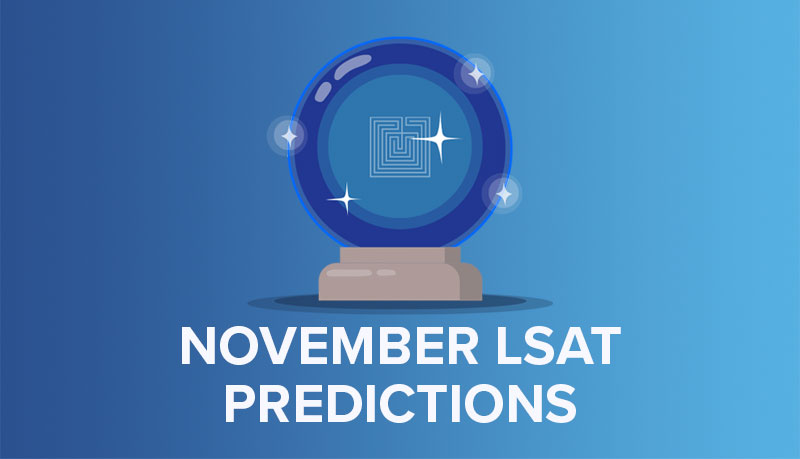November LSAT 2023 Predictions
- by
- Nov 06, 2023
- LSAT, LSAT predictions
- Reviewed by: Matt Riley

Feel that chill in the air? November has arrived, and that means the grand finale of 2023 LSATs is around the corner! Are we exaggerating it a tad? Maybe, but the November LSAT has always been pretty special.
It’s the final chance to get your LSAT scores back in time to still apply “early” to law school. Or, alternatively, it can help you decide if you might retake the LSAT in January.
But we don’t want to think about retaking the LSAT. So to ensure you’re 100% prepared on test day, here’s what we think you’ll see on the 2023 November LSAT.
What Will Be on the November LSAT?
Logical Reasoning
The Logical Reasoning Section will look relatively similar to your practice tests. The LSAT hasn’t really changed this section for a while. The concepts should be familiar to you by now.
You can expect mostly easy to medium questions until around question 13. The difficulty will reach its peak around question 22. With this in mind, save enough time for those trickier questions later on.
You also should be on high alert for tricks and traps after reaching question 16. The higher-difficulty questions tend to have more tempting (but ultimately wrong) answer choices.
The LSAT has fallen in love with disagree and agree questions a bit recently. These are relatively infrequent question types overall, but I wouldn’t be surprised to see one or two.
Analyze each argument independently and zero in on the precise elements that overlap between the arguments. Remember that you can’t have an agreement or disagreement unless both speakers opine on a given topic. Avoid answers that make assumptions about what either or both speakers would think.
Sign up to get expert tips and exclusive invites to free LSAT classes and law school admissions workshops!
Reading Comprehension
Like Logical Reasoning, the Reading Comprehension Section ramps up in difficulty as it goes. That said, the difficulty curve is a bit less steep than we see in Logical Reasoning and the time investment per passage should reflect that.
If you are aiming to get to all the passages with standard timing, I’d aim for 7:30 – 8:30 minutes on the first two passages and 8 – 9:30 minutes on the last passages. With LSAT timing accommodations, I’d multiply these numbers by the amount of time you have.
You will get exactly one comparative passage on test day, and three non-comparative passages. For the comparative passage, you can expect to be heavily tested on the similarities and differences between passages. These are essentially very long disagree/agree prompts and questions, so treat them the same way.
If a question is asking about what both speakers think, make sure the answer you choose is within the scope of each passage individually as well as within the scope of the overlap between the two passages.
Logic Games
Let’s address the elephant in the room: the countdown clock for the Logic Games Section. The LSAT recently announced that the last LSAT that will include logic games will be June 2024, with August 2024 not containing any logic games at all. In their place, you’ll get an extra scored logical reasoning section.
This could mean that the LSAT will throw in some extra twists and wrinkles on the remaining Logic Games sections until then, with a slightly higher chance you see neither games or other unusual games on test day.
You’ll definitely get at least one ordering game and one grouping game on test day, and likely will run into a combo game as well. For game 3 or 4 in a given section, be on the lookout for that oddball game.
If a game does throw an extra twist to the normal formulas on a given game, make sure your setup has space to keep track of whatever the game focuses on, and I would start with those conditional questions with new rules as a way of testing out how the game functions, particularly if there aren’t many deductions to make upfront.
More generally, logic games tend to test those areas that they focus on with the rules and setup, so if there’s a particularly unusual element, that likely will be the key to unlocking the game. Bring these elements back to your normal rules and restrictions for grouping and ordering games and you’ll be in great shape to tackle these games.
Final Thoughts
You’ve likely heard this before, but if your confidence needs an extra boost this week, remember that the LSAT is [supposed to be] a challenging but fair test. The last thing LSAC wants is a reasonable debate as to which answer is the correct one on a given question, or, even worse, that they have to throw a question out because it was unfair. Use this to your advantage.
The LSAT is a risk-averse test. It tends to lean in favor of easy-to-defend answer choices while adding false or unsupported elements to wrong answers.
If you’re stuck between answer choices on a question, particularly in Reading Comprehension and Logical Reasoning, identify what certain answers are doing wrong. If all else fails, you can always skip and come back to questions. Each question is only worth one point, so it’s rarely worth it to spend a long amount of time on any one.
Beyond that, take a deep breath, crack your knuckles, and get ready to crush it! You’ve prepped for the November LSAT as much as you can. And in a few days, the only thing on your mind will be finishing your law school application AND your holiday wishlist.
Search the Blog

Free LSAT Practice Account
Sign up for a free Blueprint LSAT account and get access to a free trial of the Self-Paced Course and a free practice LSAT with a detailed score report, mind-blowing analytics, and explanatory videos.
Learn More
Popular Posts
-
logic games Game Over: LSAC Says Farewell to Logic Games
-
General LSAT Advice How to Get a 180 on the LSAT
-
Entertainment Revisiting Elle's LSAT Journey from Legally Blonde








